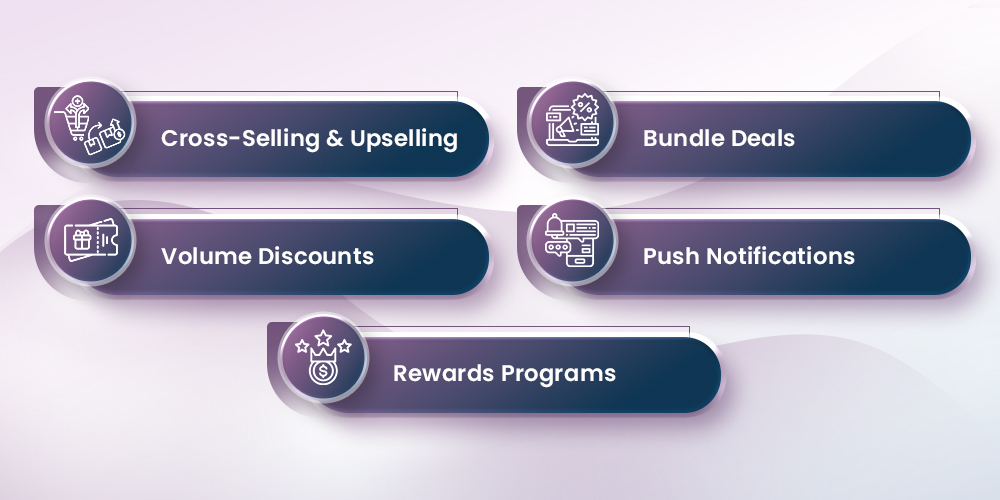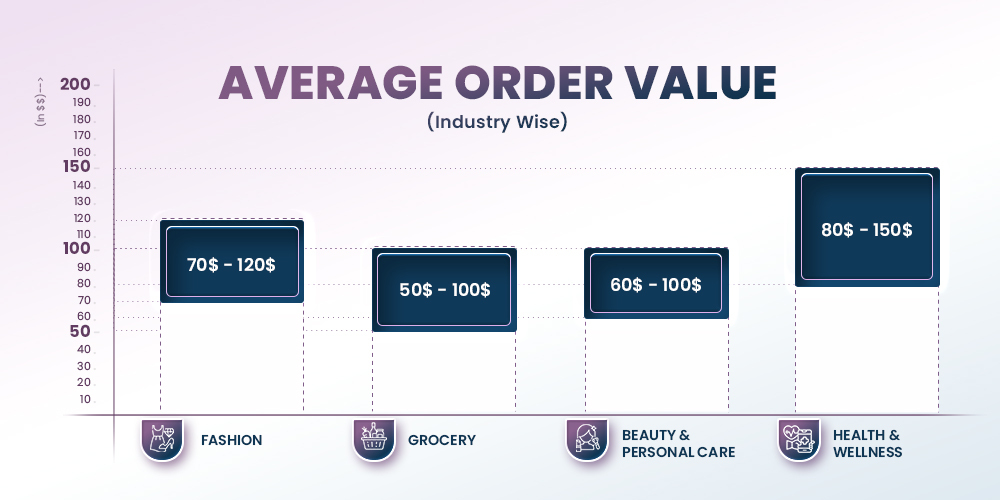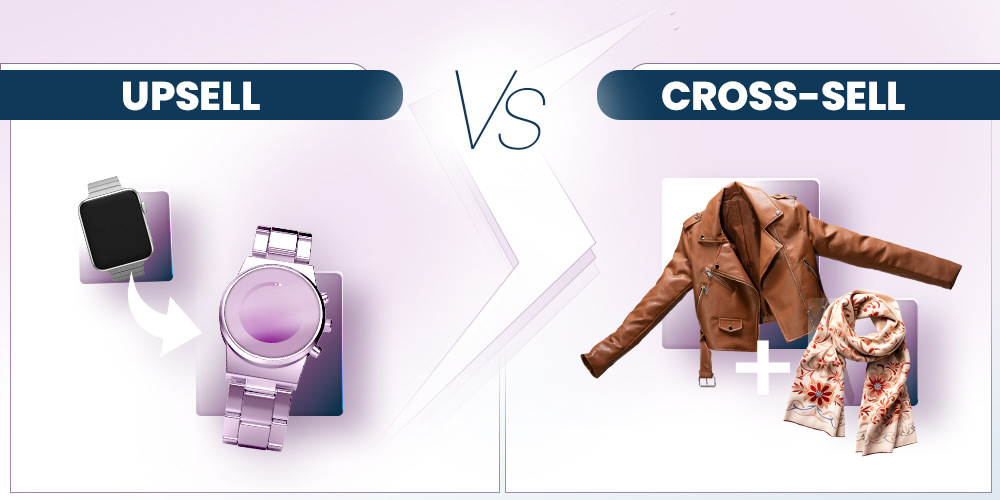How to imrpove average order value might be a question on your mind, but you find yourself clueless about it? No worries, we will discuss its ins and outs to help you maximize your revenue effortlessly.
Every time a customer makes a purchase through your app, you’re making more money. That’s what a higher AOV does. By encouraging customers to add a little extra to their cart, you can boost up your overall revenue without needing them to shop more frequently.
How To Calculate Average Order Value
Calculating the Average Order Value (AOV) is essential for understanding your business’s performance and customer spending habits. It gives you a clear picture of how much, on average, each customer spends per transaction.
Let’s say your e-commerce store generated $10,000 in revenue from 200 orders in a month. To calculate the AOV, you would divide the total revenue ($10,000) by the number of orders (200).
So, $10,000 ÷ 200 = $50.
This means that, on average, each customer spent $50 per transaction during that period. AOV is not a one-time calculation. It’s something you should monitor regularly to track changes and trends over time.
Average Order Value By Industry
Understanding AOVs helps merchants tailor their marketing and sales strategies. assists in allocating resources effectively. Merchants can invest more in customer acquisition and retention strategies for industries with higher AOVs, potentially yielding higher returns on investment.
- Fashion: AOV ranges from $80 to $120 due to purchases of clothing, accessories, and footwear, often during seasonal sales or for complete outfits.
- Grocery: AOV ranges $30 to $50, reflecting frequent, essential purchases; increasing with the popularity of online shopping.
- Beauty and Personal Care: AOV typically $50 to $80, driven by higher-priced products and bundled purchases like skincare sets.
- Health: AOV ranges $50 to $100, with purchases of vitamins, supplements, and wellness items, often involving multiple products.
Key Learnings For Online Merchants From The Average Order Values Across Different Industries
Understanding Customer Behavior:
- Recognize that fashion customers tend to make larger, less frequent purchases, while grocery shoppers prefer smaller, more frequent transactions.
- Tailor marketing and sales strategies to match these behaviors to optimize customer engagement and satisfaction.
Implementing Bundle Offers and Cross-Selling:
- Use bundle deals and cross-selling strategies effectively, especially in industries with higher average order values (AOVs) like fashion and beauty.
- Encourage customers to purchase complementary items to increase the overall transaction value.
Focusing on Customer Retention:
- Prioritize customer retention through loyalty programs, rewards, and personalized experiences.
- Build strong relationships with customers to increase their lifetime value (CLV) and encourage repeat purchases, which can lead to higher AOVs over time.
How To Improve Average Order Value Example
Increasing the average order value (AOV) is a crucial aspect of boosting revenue for any business. Here’s an example strategy with steps on how improve average order value
Example: Fashion E-commerce Store
Understanding Your Store’s Current AOV
Suppose currently, your AOV stands at around $70.
Setting a New Target
Let’s aim for a 15% increase, targeting an AOV of $80
Strategies to Boost AOV
- Cross-Selling and Up-Selling:
You know, one of the best ways to increase AOV is by suggesting additional items during the checkout process. Suggest complementary items during checkout. For instance, if someone’s buying a dress, recommend matching accessories like jewellery. - Bundle Offers:
Create fashion bundles at a discounted price. For example, a bundle with a dress, shoes, and a scarf. - Free Shipping Threshold:
Everybody loves free shipping, right? Offer free shipping for orders over $100. Customers are more likely to add more items to qualify. - Loyalty Programs:
Implement a points-based loyalty program with rewards for reaching spending thresholds. That’s a sure shot way to boost that AOV. - Limited-Time Offers:
Creating a sense of urgency can work wonders. Think about offering limited-time promotions like “spend $150, get $30 off”. It creates that push for customers to spend more to get that sweet discount before it’s gone.
Evaluating the Results
After giving it some time, let’s assess the outcomes. Let’s say, after a month, your average order value has climbed to $82, surpassing the target of $80. Hence, you have learned how to improve average order value
Refining Strategies for Ongoing Improvement
Now, let’s pinpoint which strategies worked best in boosting that AOV. If it turns out that bundle offers were the real game-changer, consider expanding your bundle options or adjusting the pricing to keep that momentum going.
Five Solid Strategies On How To Improve Average Order Value

Cross-Selling and Upselling
Cross-selling and upselling are effective strategies employed across diverse industries to increase Average Order Value (AOV) by encouraging customers to add more items to their purchase or opt for higher-value alternatives. Let’s explore how these tactics work with examples from different sectors:
Cross-Selling
Cross-selling involves suggesting additional products that complement or enhance the main item being purchased.
Examples:
- Fashion Industry:
- Scenario: A customer buys a dress online.
- Cross-Sell: The website recommends matching accessories like shoes, jewellery, or a handbag.
- Outcome: The customer decides to add one or more of these accessories to their cart, thereby increasing the total transaction value.
- Electronics Industry:
- Scenario: A customer purchases a smartphone.
- Cross-Sell: The retailer suggests accessories such as a protective case, screen protector, and headphones.
- Outcome: The customer opts to include all recommended accessories in their order, resulting in a higher AOV for the retailer.
Upselling
Upselling is about persuading customers to upgrade to a higher-priced or premium version of the product they are considering.
Examples:
- Grocery Industry:
- Scenario: A customer is shopping online for groceries.
- Cross-Sell: The online grocery store suggests adding fresh bakery items such as bread, pastries, and cakes to the customer’s cart.
- Outcome: The customer adds several bakery items to their order, increasing the total transaction value.
- Beauty and Personal Care Industry:
- Scenario: A customer is browsing skincare products on an e-commerce site.
- Upsell: The website recommends a premium skincare set that includes additional serums, masks, and moisturizers with anti-ageing benefits.
- Outcome: The customer opts for the premium skincare set, resulting in a higher AOV for the retailer and offering enhanced skincare benefits.
Try Bundle Deals
Bundle deals help increase Average Order Value (AOV) by offering customers a discounted price when they buy a curated selection of products together.
Bundling products together creates a perceived value greater than the sum of individual items. Customers feel motivated to buy more to save money or get more value, increasing their total purchase size.
“Buy 2, Get 1 Free” or “Save 20% on the Bundle” motivate customers to spend more to reach the threshold for the deal. This drives up the AOV as customers often spend slightly more to maximize their savings.
How To Improve Average Order Value With Bundle Deals?
Complementary Products: Bundle products that naturally complement each other, enhancing the customer experience and increasing purchase likelihood. For example, a skincare bundle could include a cleanser, moisturizer, and sunscreen.
Limited-Time Offers: Create urgency by offering time-sensitive bundle deals, such as “Flash Sale: 24-Hour Only Bundle Deal!” This prompts customers to make quick purchase decisions to secure the discounted bundle.
Promotional Messaging: Clearly communicate the benefits of the bundle, like cost savings or enhanced product performance, using persuasive language in your marketing materials to highlight the value proposition and encourage immediate action.
Offering Volume Discounts
Volume discounts refer to price reductions or incentives offered to customers based on the quantity or value of goods or services purchased in a single transaction.
When customers encounter discounts offered on larger quantities or higher values, they perceive it as a valuable opportunity to maximize their savings. This perception often prompts them to consider buying more items or opting for higher-priced products in a single transaction.Offering volume discounts will foster loyalty as customers may prefer to consolidate their purchases with one vendor to take advantage of savings.
Tips for Structuring Effective Volume Discounts:
- Clear Thresholds: Define clear thresholds for volume discounts, such as “Buy 3, Get 10% Off” or “Spend $100, Get 15% Off.” This clarity helps customers understand what they need to do to qualify.
- Graduated Discounts: Offer graduated discounts where the percentage discount increases with higher quantities or values purchased. For example, 5% off for 2 items, 10% off for 3 items, and 15% off for 4 items.
- Promote Bundles: Combine volume discounts with bundle offers to encourage larger purchases. For instance, “Buy 2 and Get 10% Off Each” for related products or “Buy the Bundle and Save 20%.”
- Limited-Time Offers: Introduce urgency with time-limited volume discounts, such as weekend specials or seasonal promotions, to prompt quicker buying decisions.
- Highlight Savings: Clearly communicate the potential savings with volume discounts through promotional messaging on your website, emails, and social media channels.
Leverage Push Notifications To Improve Average Order Value
Push notifications appear on customers’ devices instantly, capturing their attention and prompting immediate action. This level of alertness is ideal for promoting limited-time offers, flash sales, or exclusive deals.
- Personalization and Relevance: By leveraging customer data, businesses can send highly personalized messages tailored to individual preferences, past purchases, and browsing behavior. Personalized notifications make customers feel valued and more likely to make additional purchases.
- Driving Urgency and FOMO: Push notifications are excellent for creating a sense of urgency or scarcity, such as “Only a few left in stock!” or “24-hour sale – don’t miss out!” This can drive quick decisions and higher transaction values.
- Boosting Repeat Purchases: By sending reminders about abandoned carts, special promotions, or new arrivals,push notifications help encourage repeat purchases, thereby increasing AOV over time.
Proven Tips for Creating Targeted and Compelling Push Notifications
- Know Your Audience:
Segment your audience based on demographics, purchase history, and behavior. Tailoring notifications to specific segments ensures they are relevant and more likely to resonate with the recipients. - Craft Clear and Concise Messages:
Keep your messages short and to the point. Use action-oriented language and a compelling call-to-action (CTA), such as “Shop Now,” “Save 20% Today,” or “Get Yours Before It’s Gone!” - Incorporate Personalization:
Use customer names, past purchase data, or browsing history to make notifications feel personalized. For example, “John, don’t miss out on our new summer collection!” - Use Eye-Catching Visuals:
Include images, GIFs, or emojis to make notifications visually appealing and stand out on the user’s screen. A well-designed notification is more likely to grab attention and prompt action. - Timing is Key:
Send notifications at optimal times when customers are most likely to engage. Test different times and days to find what works best for your audience.
Boost your Average Order Value (AOV) by incorporating Advanced Push Notifications in your mobile app
Gamification and Rewards Programs
Gamification elements such as points, levels, badges, or virtual rewards incentivize customers to return to the store or platform to earn more rewards. This frequent engagement often leads to increased spending per transaction as customers strive to reach higher reward tiers or unlock exclusive benefits.
Loyal customers tend to spend more and are more likely to choose the brand over competitors, further contributing to increased average order value
Examples of Successful Implementations:
- Starbucks Rewards: Starbucks’ mobile app and rewards program use gamification to encourage frequent visits and higher spending. Customers earn stars for every purchase, which can be redeemed for free drinks or food items. The tiered rewards structure motivates customers to earn more stars by making additional purchases, thereby increasing AOV.
- Sephora Beauty Insider: Sephora’s Beauty Insider program offers points for purchases, which can be redeemed for beauty products or experiences. They also offer exclusive member-only events and personalized recommendations based on customers’ beauty profiles, encouraging higher-value purchases in-store and online.
Average order value by industry

Get These Apps To Grow Your Average Order Value
- Yotpo Loyalty & Rewards
- Flits: Customer Account Page
- Growave: Loyalty & Wishlist
- Rewardify
- Smile: Loyalty & Rewards
- Stamped Loyalty & Referrals
These apps enable the implementation of loyalty programs, rewards, and incentives for customers to spend more. By offering rewards such as discounts, freebies, or points for purchases, they encourage customers to increase their spending, thus effectively increasing the AOV of the store.
How To Improve Average Order Value FAQs
- How often should I track and analyze Average Order Value (AOV) for my online store?
Regularly track and analyze AOV, ideally on a monthly basis, to understand customer behavior and assess strategy effectiveness. Adjust the frequency based on your business needs, aiming for consistent insights to optimize AOV. - What are the common challenges in optimizing Average Order Value (AOV), and how can I overcome them?
Common challenges include customer resistance to upselling, ineffective bundling, and difficulties in implementing personalized recommendations. Overcome these by using data analytics, tailoring strategies, and offering incentives like discounts and loyalty rewards. - How do you increase order count?
Increase order count by offering promotions like BOGO deals and limited-time discounts, optimizing your website for cross-selling and upselling, and providing excellent customer service and flexible payment options. - What affects average order value (AOV)?
Factors such as pricing strategies, product bundling, and upselling techniques affect AOV. Tiered pricing, volume discounts, bundled products, and personalized recommendations all influence customers’ purchasing decisions and encourage them to spend more per order.
To Wrap Up – Increasing Average Order Value Boost Customer Loyalty
Increasing Average Order Value (AOV) offers substantial long-term benefits for businesses. By encouraging customers to spend more per transaction, businesses can significantly enhance revenue and profitability over time. Higher AOV also contributes to improved Customer Lifetime Value (CLV), as loyal customers who consistently spend more become more valuable to the business.
About The Author
I love navigating the world of SaaS with finesse. As an SEO enthusiast and seasoned Copy Writer, I'm here to transform tech-speak into compelling narratives that resonate with online merchants. With a penchant for alliteration and a touch of humor, I bring a unique flair to SaaS content.
Related Posts
A Smarter Approach to Abandoned Cart Recovery
Abandoned cart recovery is one of the most important yet…
Turn Customer Behavior Into Sales With a Smart Data-Driven Marketing Approach
A data-driven marketing approach isn’t just a buzzword—it’s a necessity….
The Role of Customer Support for Business Growth
Did you know that 97% of consumers say customer service…
